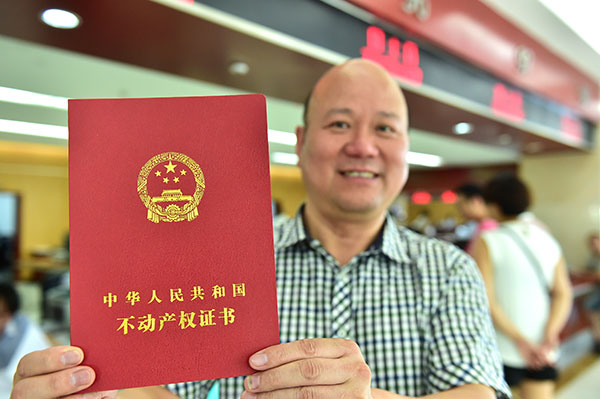Realty information platform on cards
Updated: 2015-08-07 07:41
By Zheng Yangpeng(China Daily)
|
|||||||||||
 |
|
He Xianmin, a Yiwu, Zhejiang province resident with the revamped real estate right certificate. The certificate information will be included in the proposed national unified information platform, that will be established by 2017, paving the way for the possible levy of property taxes. [Lyu Bin / China Daily] |
Database could pave the way for a new property tax system, better consolidation of industry
A national property information platform is set to be established by 2017, paving the way for a possible new property tax, according to a document released by the Ministry of Land and Resources on Thursday.
The platform is a central piece in China's planned real-estate registration project, formally launched earlier this year, which is aimed at ending a patchwork system which is overseen by various departments in various cities.
The current fragmentation of the system means the government cannot track a person's entire property portfolio if it is spread across different cities, making it impossible to levy property taxes nationwide.
The ministry said the platform would consolidate all real-estate information across various administrative levels, and a national database should be implemented by 2016, before a larger information platform covering the entire nation was established the following year.
The database plan comes as the top legislature recently placed its long-awaited property tax law on the legislative agenda. It is expected to be passed as early as 2017.
Analysts said in theory, the passing of the law and the creation of the unified information platform would then clear the way for a new property tax.
However, various considerations could still delay the process.
Policymakers would have to weigh, for instance, between gains that might be made from additional sources of tax introduced, and the loose from the dampened broader property market.
They are also likely to be cautious, they said, given land-sale revenues and property transaction-related taxes already account for 52 percent of total local government revenue.
"I think a massive property tax on all existing properties would be difficult to introduce, even in a few years," said Jeffery Gao, head of China Property Research, Nomura Securities.
"It will not gain any ground unless China's economy has really shaken off its reliance on real estate."
Related Stories
Realty data shares hit rough patch amid sales downturn 2014-06-14 07:25
VAT net to be widened to realty, finance and consumer services 2015-06-05 08:10
Chinese investors shifting focus in global realty purchases 2015-02-12 08:30
Japanese realty continues to languish 2015-01-06 12:17
BOC affiliate eyes US commercial realty deal 2014-12-10 09:14
Today's Top News
China asks further probe into MH370
'New Suez Canal' opened for ship traffic
China's property taxes coming soon
Seven arrested for trafficking women into sex slavery in China
ROK's ex-first lady begins
DPRK visit
Australia to continue search for MH370
Turkey says coalition to launch 'comprehensive battle' against IS
17 armed forces take part in Russia military contest
Hot Topics
Lunar probe , China growth forecasts, Emission rules get tougher, China seen through 'colored lens', International board,
Editor's Picks

|

|

|

|

|

|






